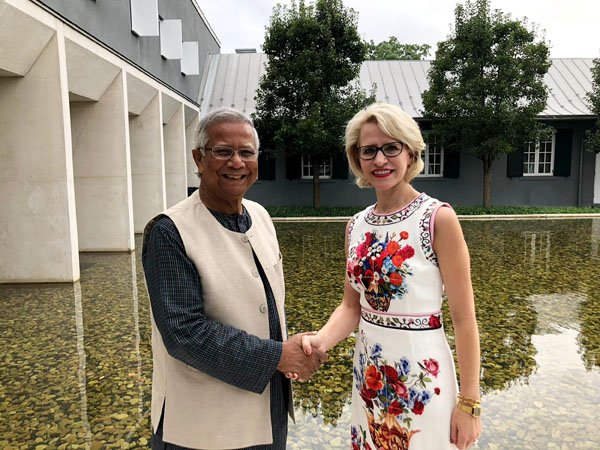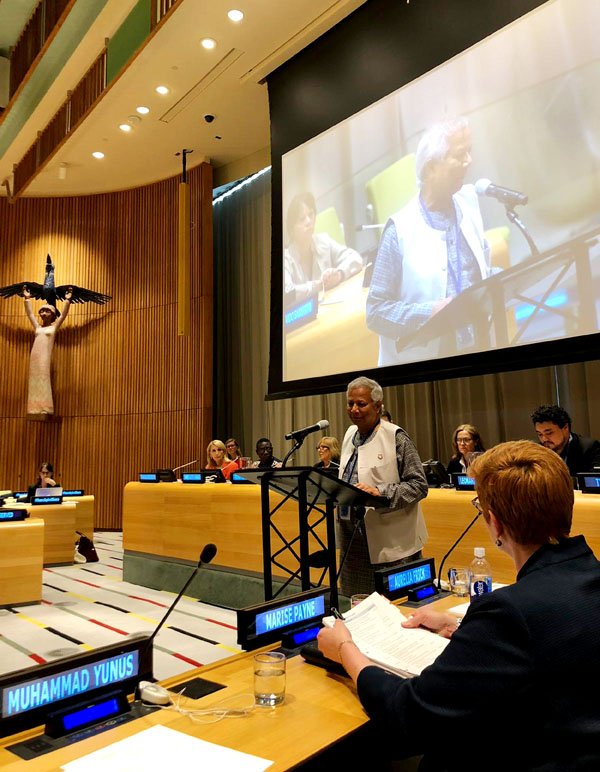Yunus speaks as Co Convenor of Financial Sector Commission on Eliminating Modern Slavery and Human Trafficking
Press Release (September 27, 2018)

Nobel Laureate Professor Muhammad Yunus with the Convenor of the Global Financial Sector Commission, H.E. Aurelia Frick, Foreign Minister of Liechtenstein.
(New York –24 September 2018)–The Financial Sector Commission on Modern Slavery and Human Trafficking has been launched today at the United Nations during the 73rd Session of the UN General Assembly. This international initiative brings together leaders from across the financial sector, global regulators, survivors and non-governmental organizations to find innovative ways to end these pervasive human rights abuses.By the best available estimate, over 40.3 million men, women and children experienced one of these forms of exploitation in 2016 – equating to 1 in every 185 people. Though illegal, proceeds from forced labor alone are estimated to generate over $150 billion annually.
The Commission is convened by the Foreign Minister of Liechtenstein, H.E. Dr Aurelia Frick, along with co-conveners Minister of Foreign Affairs of Australia, Senator the Hon Marise Payne, and the micro-credit pioneer and Nobel Prize laureate, Professor Muhammad Yunus. It is chaired by Fiona Reynolds, the CEO of the UN-backed Principles for Responsible Investment.
The first consultation of the Financial Sector Commission was held on 20-21 September 2018 in at Greentree Estate, New York. The next consultation is scheduled to be held in Vaduz, Liechtenstein in early 2019 with a further consultation in Australia in spring 2019.
According to the most recent estimates, over 40 million people were enslaved in 2016 and proceeds from these illegal practices reached $150 billion. After 193 countries pledged to take effective measures to end modern slavery and human trafficking by 2030, the UN Security Council has underlined the role that financial institutions can play in detecting and disrupting financial flows associated with these crimes.
The financial sector can come into contact with modern slavery and human trafficking in various ways, such as handling funds generated by such practices or financing goods and services that profit from it in their supply chains. Given its global reach and access to financial data necessary to target such abuses, the sector is also pivotal to the solution. From promoting human rights due diligence, developing innovative financing arrangements, and promoting inclusive financial technology, it is uniquely positioned to combat modern slavery and human trafficking.
The Commission, known as the Liechtenstein Initiative, was formed as a public-private partnership between the Government of the Principality of Liechtenstein together with the Department of Foreign Affairs and Trade of the Australian Government and the Center for Policy Research at United Nations University, the UN’s think tank. The initiative is additionally supported by the Liechtenstein Bankers Association and the LGT Group Foundation.
H.E. Dr Aurelia Frick, Foreign Minister of Liechtenstein and Convener of the Commission, noted: “The Liechtenstein Initiative will convene leaders from across the world to draw up a practical road map of action in this area. As the Convener of this initiative, we will use our expertise as a financial center to contribute to the Commission’s work. Liechtenstein has been at the forefront of efforts to curb modern slavery and human trafficking internationally, and the Financial Sector Commission will further amplify efforts towards this goal.”
Fiona Reynolds, Chair of the Financial Sector Commission and Chief Executive of Principles for Responsible Investment (PRI), said: “The financial sector has a significant role to play in working to eradicate modern slavery and human trafficking. The Financial Sector Commission is the first of its kind to leverage expertise from all parts of the sector to take coordinated and comprehensive action on these pervasive human rights abuses,” she said. “The outcome of the Commission will outline practical, relevant and actionable steps forward in this fight.”
“Over the course of the next year, the Financial Sector Commission will delve into specific areas where the sector can take action to curb modern slavery and human trafficking,” Dr James Cockayne, head of the Commission Secretariat and Director of the Center for Policy Research at United Nations University, added. “The Commission is made up of leaders in the field with the breadth and depth of experience necessary to find innovative and sustainable solutions to ending modern slavery and human trafficking.”
Professor Yunus said that in order to address modern slavery we have to go to the root of the process which creates it in the first place. Economic flows are like ocean currents. It flows from weak currents to stronger currents. Poor people follow the path of economic flows out of desperation to find opportunity for survival. If we create opportunities for people in their places of birth they'll not take high risk to head for unknown places. We need to put emphasis on entrepreneurship rather than on job-seeking. We need to build financial system supporting new entrepreneurs coming from bottom-most levels of income, and remote places. We'll have to replace traditional job-seeking to entrepreneurship.

Nobel Laureate Professor Muhammad Yunus, Co-Convenor of the Global Financial Sector Commission on Eliminating Modern Slavery and Human Trafficking Commission, Speaking at their first conference held in New York
End
প্রেস রিলিজ
আধুনিক দাসপ্রথা ও মানব পাচার নির্মূলে জাতি সংঘের ফাইনান্সিয়াল সেক্টর কমিশনে সহ-আহ্বায়ক হিসেবে বক্তৃতা দিলেন প্রফেসর ইউনূস
নিউ ইয়র্ক, ২৪ সেপ্টেম্বর ২০১৮: জাতি সংঘ সাধারণ পরিষদের ৭৩তম সভায় “আধুনিক দাসপ্রথা ও মানব পাচার নির্মূলে ফাইনান্সিয়াল সেক্টর কমিশন” গঠিত হয়েছে। আর্থিক খাত, বিভিন্ন বৈশ্বিক নিয়ন্ত্রক সংস্থা, রক্ষাপ্রাপ্ত ব্যক্তি ও বেসরকারী সংস্থাগুলোর নেতৃবৃন্দের সমন্বয়ে গঠিত এই আন্তর্জাতিক সংস্থাটির লক্ষ্য মানবাধিকারের ব্যাপক লংঘনকারী এই দু’টি নিপীড়ন স্থায়ীভাবে নির্মূল করতে বিভিন্ন উপায় খুঁজে বের করা। সবচেয়ে নির্ভরযোগ্য তথ্য মতে, ২০১৬ সালে পৃথিবীর ৪ কোটি ৩ লক্ষেরও বেশী পুরুষ, নারী ও শিশু Ñ অর্থাৎ প্রতি ১৮৫ জনে ১ জন - এ দু’টি নিপীড়নের কোনো না কোনো একটির শিকার ছিল। অবৈধ ও শোষণমূলক শ্রম থেকে প্রতি বছর ১৫ হাজার কোটি মার্কিন ডলারেরও বেশী অর্থ আয় করা হয়েছে ।
কমিশনের আহ্বায়ক লিশটেনস্টাইনের পররাষ্ট্রমন্ত্রী মহামান্য ড. অরেলিয়া ফ্রিক। সহ-আহ্বায়করা হলেন অষ্ট্রেলিয়ার পররাষ্ট্রমন্ত্রী সিনেটর মহামান্য মারিসে পেইন এবং ক্ষুদ্রঋণের উদ্ভাবক নোবেল লরিয়েট প্রফেসর মুহাম্মদ ইউনূস। কমিশনের সভাপতি জাতি সংঘ সমর্থিত “প্রিন্সিপল্স ফর রেস্পনসিবল ইনভেস্টমেন্ট”-এর প্রধান নির্বাহী ফিয়োনা রেনল্ডস।
ফাইনান্সিয়াল সেক্টর কমিশনের প্রথম পরামর্শ সভাটি অনুষ্ঠিত হয় ২০-২১ সেপ্টেম্বর ২০১৮ নিউ ইয়র্কের গ্রীনট্রি এস্টেটে। দ্বিতীয় সভাটি ২০১৯ সালের শুরুতে লিশটেনস্টাইনের ভাদুজ-এ এবং এর পরের সভাটি সে বছরেরই বসন্তে অষ্ট্রেলিয়ায় অনুষ্ঠিত হবার কথা।
সর্বশেষ তথ্য অনুযায়ী, ২০১৬ সালে ৪ কোটিরও বেশী মানুষ ক্রীতদাস ছিল এবং সে বছর এই অবৈধ কর্মকান্ড থেকে অর্জিত অর্থের পরিমাণ ১৫ হাজার কোটি ডলারে পৌঁছেছিল। আধুনিক দাসপ্রথা ও মানব পাচার বন্ধের লক্ষ্যে কার্যকর পদক্ষেপ নিতে ১৯৩টি দেশ প্রতিশ্রুতি দেবার পর জাতি সংঘ নিরাপত্তা পরিষদ এসব অপরাধের সাথে যুক্ত অর্থ প্রবাহ চিহ্নিত ও বন্ধ করতে আর্থিক প্রতিষ্ঠানগুলোর ভূমিকার উপর গুরুত্ব আরোপ করে।
আধুনিক দাসপ্রথা ও মানব পাচারের সাথে আর্থিক প্রতিষ্ঠানগুলো বিভিন্নভাবে যুক্ত হতে পারে, যেমন এসব কর্মকান্ড থেকে অর্জিত অর্থ লেনদেন বা এসব কর্মকান্ডের সাপ্লাই চেইনে উদ্ভুত পণ্য ও সেবার অর্থায়ন। আর্থিক প্রতিষ্ঠানগুলোর যেহেতু এসব অপরাধমূলক কর্মকান্ডের সাথে যুক্তদের আর্থিক লেনদেনের তথ্য উদ্ঘাটিত করার বৈশ্বিক পর্যায়ের সক্ষমতা রয়েছে, এর সমাধানেও আর্থিক খাত গুরুত্বপূর্ণ ভূমিকা পালন করতে পারে। মানবাধিকার প্রতিষ্ঠা, উদ্ভাবনশীল আর্থিক ব্যবস্থার বিকাশ ও অন্তর্ভূক্তিমূলক আর্থিক প্রযুক্তি গড়ে তুলতে আর্থিক প্রতিষ্ঠানগুলো প্রতিশ্রুতিবদ্ধ হওয়ায় আধুনিক দাসপ্রথা ও মানব পাচার রোধে এরা খুবই কার্যকর ভূমিকা পালন করতে সক্ষম।
লিশটেনস্টাইন ইনিসিয়েটিভ হিসেবে পরিচিত এই কমিশনটি প্রিন্সিপালিটি অব লিশটেনস্টাইন সরকার, অষ্ট্রেলিয়ান সরকারের বৈদেশিক ও বাণিজ্য বিভাগ এবং জাতি সংঘের থিংক ট্যাংক হিসেবে খ্যাত জাতি সংঘ বিশ্ববিদ্যালয়ের সেন্টার ফর পলিসি রিসার্চের মধ্যকার একটি পাবলিক-প্রাইভেট পার্টনারশীপ হিসেবে গঠিত হয়েছে। এই উদ্যোগে সহায়তা করছে লিশটেনস্টাইন ব্যাংকার্স অ্যাসোসিয়েশন ও এলজিটি গ্রুপ ফাউন্ডেশন।
কমিশনের আহ্বায়ক লিশটেনস্টাইনের পররাষ্ট্রমন্ত্রী মহামান্য ড. অরেলিয়া ফ্রিক বলেন, “ লিশটেনস্টাইন ইনিসিয়েটিভ এই কাজে একটি বাস্তবসম্মত রোড ম্যাপ তৈরীর লক্ষ্যে বিশ্বনেতাদের একত্রিত করবে। এই উদ্যোগের আহ্বায়ক হিসেবে কমিশনের কাজে অবদান রাখতে একটি আর্থিক কেন্দ্র হিসেবে আমরা আমাদের দক্ষতা কাজে লাগাবো। আধুনিক দাসপ্রথা ও মানব পাচার রোধে পরিচালিত আন্তর্জাতিক প্রচেষ্টায় লিশটেনস্টাইন গুরুত্বপূর্ণ ভূমিকা পালন করছে এবং ফাইনান্সিয়াল সেক্টর কমিশন এই লক্ষ্যকে এগিয়ে নিতে সহায়তা করবে।”
কমিশনের সভাপতি ও প্রিন্সিপল্স ফর রেসপনসিবল ইনভেস্টমেন্ট-এর প্রধান নির্বাহী ফিয়োনা রেনল্ডস বলেন, “আধুনিক দাসপ্রথা ও মানব পাচার নির্মূলে আর্থিক খাত একটি গুরুত্বপূর্ণ ভূমিকা পালন করতে পারে। ফাইনান্সিয়াল সেক্টর কমিশন আর্থিক খাতের বিভিন্ন অংশের দক্ষতাকে ব্যবহার করে বিশ্বব্যাপী মানবাধিকারের এই ব্যাপক লংঘনের বিরুদ্ধে একটি সমন্বিত ও শক্তিশালী ব্যবস্থা গ্রহণে প্রথম উদ্যোগ। এই যুদ্ধে কমিশন বাস্তবসম্মত, প্রাসঙ্গিক ও বাস্তবায়নযোগ্য অবদান রাখবে।”
কমিশন সচিবালয়ের প্রধান ও জাতি সংঘ বিশ্ববিদ্যালয়ের সেন্টার ফর পলিসি রিসার্চের পরিচালক ড. জেমস ককেইন বলেন, “ফাইনান্সিয়াল সেক্টর কমিশন আগামী কয়েক বছরে কিছু সুনির্দিষ্ট জায়গায় অনুসন্ধান চালাবে যেখানে আর্থিক খাত আধুনিক দাসপ্রথা ও মানব পাচারের বিরুদ্ধে ব্যবস্থা নিতে পারবে।” তিনি আরো বলেন, “কমিশন এমন সব নেতৃস্থানীয় ব্যক্তিদের নিয়ে গঠিত হয়েছে যাঁদের এ ক্ষেত্রে ব্যাপক অভিজ্ঞতা রয়েছে এবং যাঁরা পৃথিবী থেকে আধুনিক দাসপ্রথা ও মানব পাচার নির্মূলে কার্যকর, উদ্ভাবনশীল ও টেকসই সমাধান খুঁজে বের করতে সক্ষম।”
প্রফেসর ইউনূস বলেন যে, আধুনিক দাসপ্রথার সমস্যা মোকাবেলা করতে হলে প্রথমেই আমাদেরকে এই সমস্যা সৃষ্টির মূলে যেতে হবে। অর্থনীতির প্রবাহ সমুদ্র¯্রােতের মতো যেখানে দুর্বল ¯্রােত সবলতর স্রোতের দিকে ধাবিত হয়। দরিদ্র মানুষ বেঁচে থাকার তাগিদে বাধ্য হয়ে অর্থনীতির প্রবাহকে অনুসরণ করে। আমরা যদি মানুষের জন্য তাদের নিজ নিজ আবাসস্থলে সুযোগ তৈরী করে দিতে পারি তাহলে তারা কখনোই বিশাল ঝুঁকি নিয়ে অজানার উদ্দেশ্যে জন্মভূমি ত্যাগ করবে না। আমাদের বরং তাদেরকে চাকরি খোঁজার চেয়ে উদ্যোক্তা হতে সাহায্য করা দরকার। আমাদের এমন প্রাতিষ্ঠানিক কাঠামো গড়ে তুলতে হবে যা একেবারে তৃণমূল পর্যায়ে নি¤œতম আয়ের মানুষদেরকে উদ্যোক্তা হতে সহায়তা করবে। চাকরি খোঁজার গতানুগতিক সংস্কৃতির স্থলে আমাদেরকে মনোযোগ দিতে হবে উদ্যোক্তা সৃষ্টির দিকে ।


